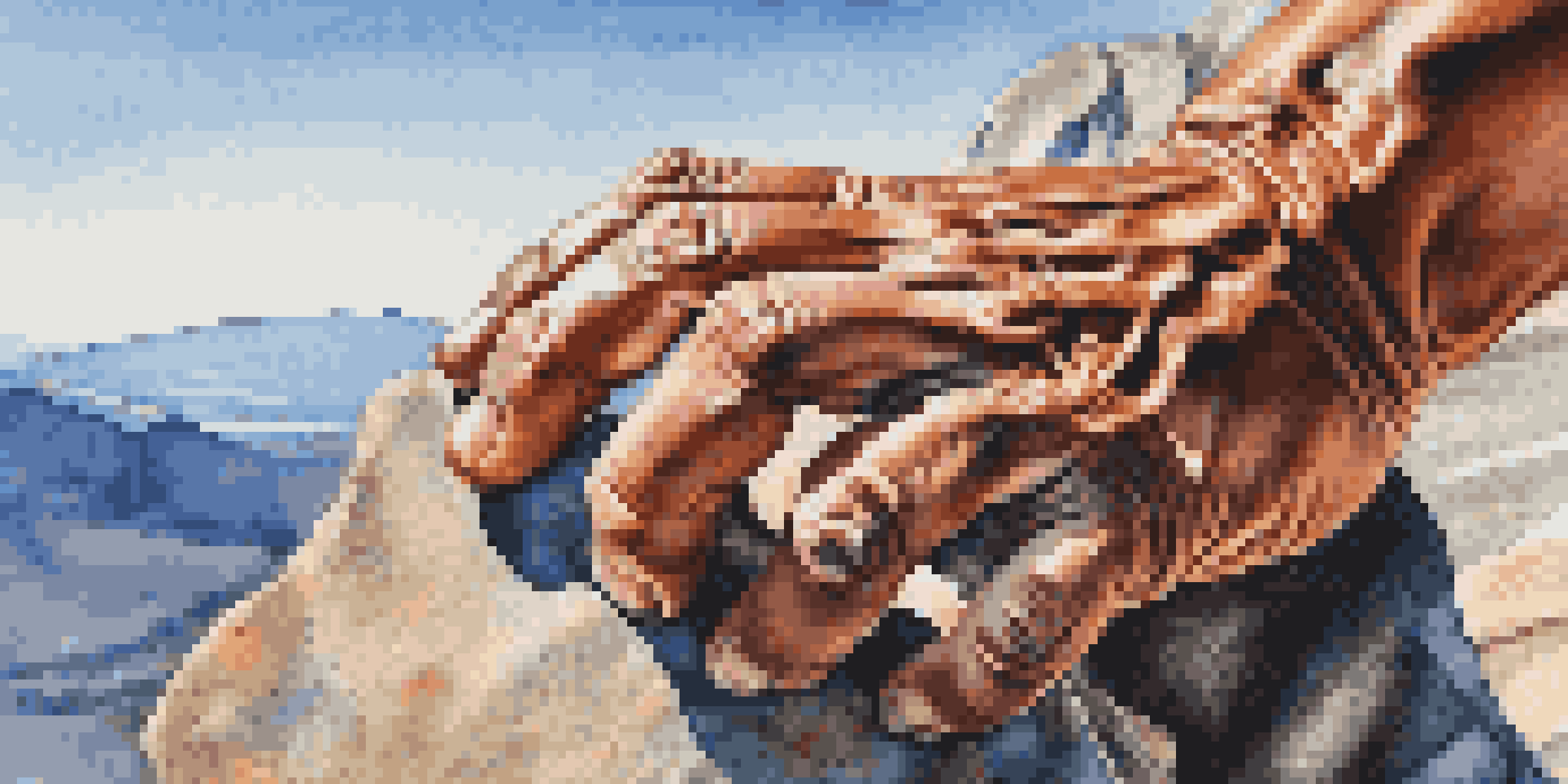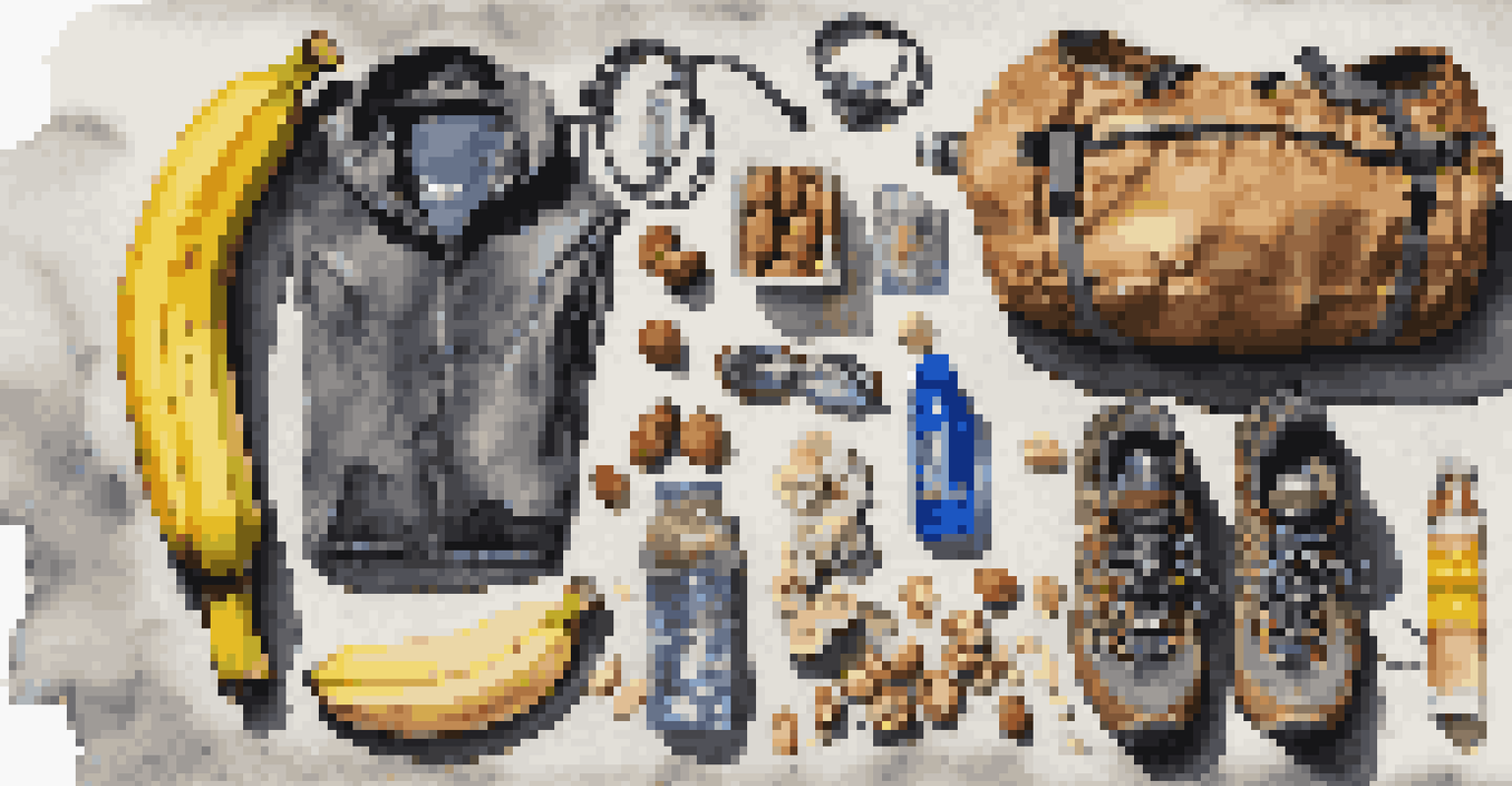The Importance of Hydration in Rock Climbing Performance

Why Hydration Matters for Climbers
Hydration is crucial for everyone, but it holds special significance for athletes, especially rock climbers. When you're scaling a rock face, your body undergoes intense physical exertion, and staying hydrated ensures that your muscles and joints function optimally. Dehydration can lead to fatigue, decreased strength, and impaired coordination, all of which can hinder your climbing performance.
Water is the source of life, and hydration is key to achieving your peak performance.
Moreover, hydration helps regulate your body temperature. As you climb, your body generates heat, and if you’re not adequately hydrated, it can be challenging to cool down. This can lead to heat-related issues, making it essential to drink water before, during, and after your climbs to keep your body in peak condition.
In essence, proper hydration can be the difference between a successful climb and a frustrating experience. By understanding its importance, climbers can better prepare for their adventures and push their limits safely.
Signs of Dehydration to Watch Out For
Recognizing the signs of dehydration is key for any climber. Common symptoms include thirst, dry mouth, headaches, and fatigue. If you notice these signs, it’s a clear indication that your body needs more fluids to function effectively. Ignoring these cues can lead to more severe consequences, such as dizziness or even fainting.

Another subtle sign to be aware of is the color of your urine. A pale yellow color generally indicates proper hydration, while darker shades signal that it’s time to hydrate. Keeping an eye on your urine color is a simple way to monitor your hydration levels throughout your climbing day.
Hydration is Key for Climbers
Staying hydrated enhances muscle function and helps regulate body temperature, critical for optimal climbing performance.
Being proactive about hydration can prevent these issues from escalating. By staying attuned to your body’s signals, you can ensure that you’re always ready to tackle that next challenging route.
Hydration Strategies for Climbers
To stay hydrated, it's essential to develop a hydration strategy tailored to your climbing routine. Start by drinking water throughout the day, not just when you're about to climb. Aim for at least 8-10 cups of water daily, adjusting your intake based on the intensity and duration of your activities.
You can't climb the mountains of life without first climbing the mountains of hydration.
When climbing, consider carrying a water bottle or hydration pack for easy access. It’s beneficial to take small sips regularly rather than gulping down large amounts at once. This approach helps your body absorb fluids more effectively and keeps you from feeling bloated while climbing.
Also, don't forget about electrolytes! During long climbs or hot days, replenishing lost salts is vital. You might want to incorporate electrolyte tablets or sports drinks into your hydration plan to maintain balance and enhance performance.
Impact of Altitude on Hydration Needs
For climbers tackling high-altitude routes, hydration becomes even more critical. As you ascend, the air becomes thinner, and your body works harder to deliver oxygen to your muscles. This increased effort can lead to faster dehydration, making it essential to monitor your fluid intake closely.
Additionally, altitude can lead to increased urination, further exacerbating the risk of dehydration. As your body acclimatizes, it’s crucial to remain vigilant about hydration, especially during the initial days at higher elevations.
Recognize Dehydration Signs
Being aware of symptoms like dry mouth and dark urine allows climbers to address hydration needs before they escalate.
Incorporating hydration breaks into your climbing routine can help you stay ahead. Drinking regularly, even when you don't feel thirsty, can make a significant difference in your performance and overall well-being on the rock face.
Hydration and Recovery After Climbing
Hydration doesn’t stop once you’ve reached the ground; it’s equally important for recovery. After a climbing session, your body needs to replenish lost fluids to aid muscle recovery and reduce soreness. Proper hydration supports the healing process and helps prevent cramping and other post-climb issues.
It’s a good practice to drink water or an electrolyte drink soon after you finish climbing. This can help restore balance and prepare your body for the next adventure. Pairing hydration with a nutritious snack can further enhance recovery by providing the necessary nutrients your body craves.
Remember, recovery is just as vital as the climb itself. By prioritizing hydration during this phase, you set yourself up for success in your next climbing outing.
Common Myths About Hydration
There are several myths surrounding hydration that can mislead climbers. One common belief is that you should only drink water when you feel thirsty. However, thirst is often a late indicator of dehydration, so it’s essential to proactively hydrate throughout your climbing sessions.
Another myth is that caffeine and alcohol can replace water. While these beverages can be enjoyable, they may lead to dehydration rather than hydration. It’s best to consume them in moderation and prioritize water or electrolyte-rich drinks instead.
Nutrition Supports Hydration
Incorporating hydrating foods like fruits and vegetables can boost overall fluid intake and aid in electrolyte replenishment.
By debunking these myths, climbers can adopt smarter hydration habits that enhance their performance and overall climbing experience.
The Role of Nutrition in Hydration
Nutrition and hydration go hand in hand, especially for rock climbers. Foods with high water content, such as fruits and vegetables, can contribute to your overall fluid intake. Incorporating these hydrating foods into your diet can help maintain hydration levels while providing essential vitamins and minerals.
Moreover, certain foods can aid in electrolyte replenishment. For instance, bananas are rich in potassium, which is vital for muscle function. Pairing these foods with adequate water intake can create a powerful combination for optimal performance.

Ultimately, a well-rounded diet, combined with proper hydration, can significantly influence a climber’s stamina and strength. Paying attention to both aspects will set you up for success on the rock face.